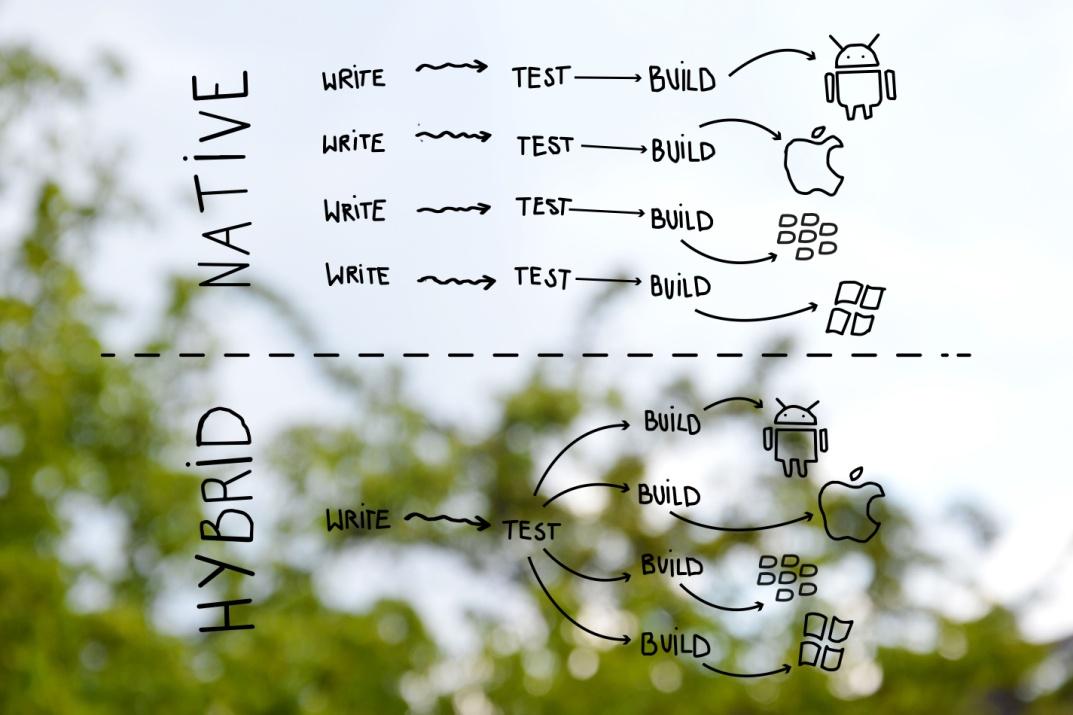5 min read
How your business can benefit from a multi-platform app development approach
Anurag : Apr 13, 2020 11:56:35 AM


Application Development or also prominent as mobile app development is the technical process of designing and developing applications for mobile applications. These include personal virtual assistants, mobile phones, enterprise digital assistants, and lots more. Everything and every gadget today needs an app. Whether it’s a clothing brand, foodstuffs, hotel room, travel agency, Advertisement Company, or malls, everyone has a website and application too.
There are many mobile devices and mobile brands in the world for people. Every business has an idea that an application is essential for the website or products sale. Native applications are user-friendly, easy-to-use, simple, professional, and performant. But sometimes it happens that necessary resources for designing and developing the native mobile applications for multiple platforms are somewhat expensive for the start-up businesses and small scale business. Although the native experience is the motto, there are innumerable ways and approaches to improve the quality of the application development and construction. These approaches can be great for small business app development. Now let's explore how multi-platform app development is beneficial to all businesses.
Benefits of multi-platform mobile app development
Multi-platform application development includes constructing apps for mobile operating systems. This lets them access apps from multiple app stores like App Store, Google Play, and lots more. If a developer is developing apps for the iOS devices, then he or she may use hi-tech programming languages like Swift or Objective-c or anything else. Apple, as well as Google app developers, are provided with unique development tools, interface elements, and lots more. Moreover, many companies will invest in mobile application development to get unparalleled benefits. So, let us discuss them one by one in detail.
1. Better speed
No matter what you do about the business, having an app is utterly important. With hybrid app development approach, the application is developed and optimized for multiple platforms. This assures the smooth running of the device. Moreover, multiple platform applications become fast and responsive. They are built with core programming language and APIs. The app is more efficient, and the operation of the device becomes super quicker.
2. More secure apps
With the exclusive development of different advanced applications, these are becoming more secure. Mobile application developers are extensively using programming languages like HTML5, CSS, JavaScript, and lots more. Developing a hybrid application can be a challenging task, but this is a great way to guarantee users about their data protection and security.
3. Interactive and intuitive
The hybrid applications run much smoother than with regards to input and output. The applications help devices and the Operating Systems to work in a better way and make them look like an elemental part of the gadget. Moreover, the applications have a great user experience. The mobile applications are designed specifically for the operating system. The applications enhance and improve the user experience. This improves the flow of the application and is to have specific UI Standards for several platforms. These apps work smoothly and improve the overall performance of the device.
4. Access to device capabilities
Hybrid apps are designed and developed for multiple device and operating systems. They take full advantage of the features of the software and operating systems now with advancements in the tools used. Moreover, these applications can access the device or gadget hardware like GPS, Microphone, Camera, and lots more.
5. Maintaining two codebases can be daunting
App developers sometimes find it difficult to maintain two different applications than maintaining two applications in one code base. With multi-platform app development, they have to fix bugs in a single code base rather than all code files.
6. More cost effective in the longer run
To develop an application, it takes a lot of costs. But once you make the multi-platform applications, you can save a lot of money and time in the long run. The applications offer a great experience to the users, better performance of the device; leverage the device features, and lots more. Moreover, the applications help a user to gain more personalized experience that proves to be rewarding in the long run. The multi-platform applications can boost conversion rates, sales, and this will ultimately increase customer loyalty.
7. Better sales
It is not an unknown thing that an application can help you to grow considerable sales of the product. The multi-platform application helps a business to grow its sales and marketing activities of the product by making them available on multiple platforms simultaneously. Businesses are now finding it extremely easy to boost their sales of the products and services.
8. Great UI and UX
Several applications are designed and developed every day. These multi-platform applications are great to use, simple and have lots of functionalities in store. They have excellent designs, user interface, and user experiences- the implementation of sophisticated animation or UI design.
9. Better security and reliability
Applications are the best source to rely on products, companies, and solutions. Applications developed are checked and also approved by the different app stores.
10. Ease of implementation
It is extremely easy to implement new sophisticated features in the application. The advanced features that the customer demands such as Artificial Intelligence, Internet of Things, Virtual Reality, and lots more.
11. Easy access
The multi-platform application is easy to access from any device and anywhere. A user can easily access the applications in the offline mode too. Internet connection is only required to operate the corresponding functionality for the multi-platform application development.
12. Uniformity
The multi-platform application gives consistency to operate any app or software. It provides the best user experience and also very easy to use. The app is made up of single codebase extensively used for developing the cross-platform mobile application that helps in maintaining the look and feel of the application on all the platforms.
13. Easy deployment
Most of the multi-platform integrates with a different module and extensions that work seamlessly with other tools and apps. Thus this helps to improve the app functionality as well as device performance. It becomes easy and faster to develop, deploy, and maintain codes for the application for all platform functions. Moreover, the latest updates get easily synced across devices as well as the platforms.
Now let us look at which tools are extensively used to develop these multi-platform applications.
1. ReactNative
Released by Facebook, ReactNative lets you build applications on multiple platforms using a consistent developer experience with JavaScript and React. This is possibly one of the most famous technologies right now to build multi-platform apps. Facebook uses ReactNative in multiple production apps
2. NativeScript
NativeScript is the modernized and advanced open-source framework to build applications for Android, IOS as well as Windows mobile handset. These applications are made up of single code base JavaScript. This unique code simplifies mobile application development and also helps to increase productivity by letting developers to leverage components like APIs, functionalities, and lots more.
3. Xamarin
Xamarin is Microsoft’s C# Codebase for designing and development of a robust multi-platform application. This can be used to develop a mobile application for Android, IOS, Windows mobile devices. Moreover, it has a cloud service that lets mobile testing on several devices.
4. PhoneGap
Developed by the Adobe, PhoneGap is one of the most preferred and accessible tools for the development of a multi-platform mobile app. It is indeed a free tool that allows fresher developers to design and write applications with the use of HTML5, JavaScript, CSS, and lots more. Moreover, it helps in developing applications for BlackBerry as well as Windows platforms.
5. Flutter
Offered by Google, Flutter is fast gaining popularity as the go-to SDK for developing multi-platform apps. Flutter helps developers and designers build mobile apps for iOS and Android. It is also used by Google in production apps, works with Firebase and is open-source.
The multi-platform approach has been majorly accepted by the developers worldwide. These tools make development fragile and flexible. It is vital to make a correct strategy for the multi-platform app development by the companies. A smart approach is to study parameters like customers demand, competitors methodologies, demographics, mobile device used majorly by the customers, the budget of the customers, and lots more. This study and analysis can surely help a developer to understand whether the multi-platform app development is suitable for the organization or not.
Need help with your mobile apps? Get in touch

How to convert a web app into a mobile app
Today, we can see the use of different kinds of applications or software for accomplishing various business tasks. From managing inventory of a...


